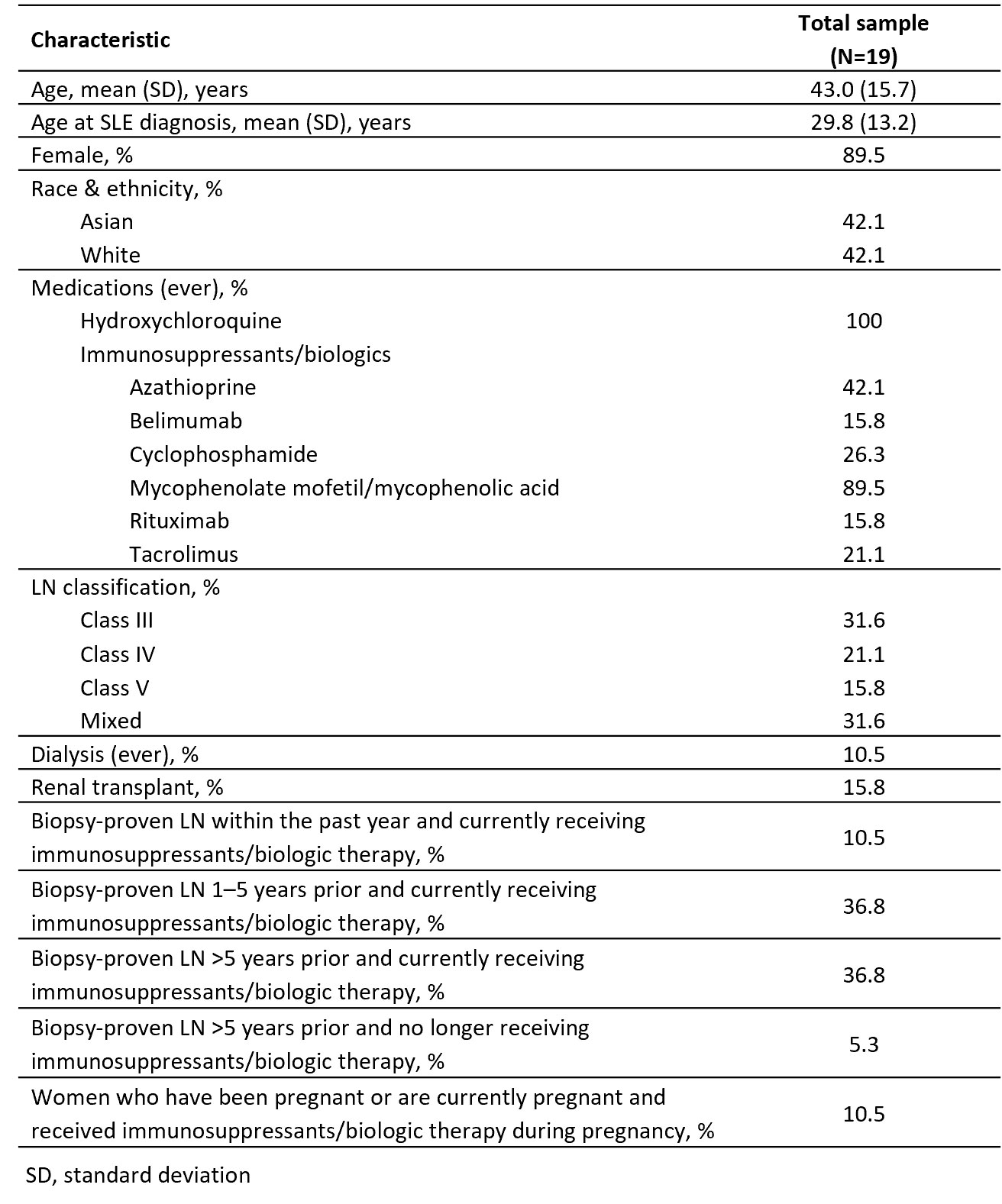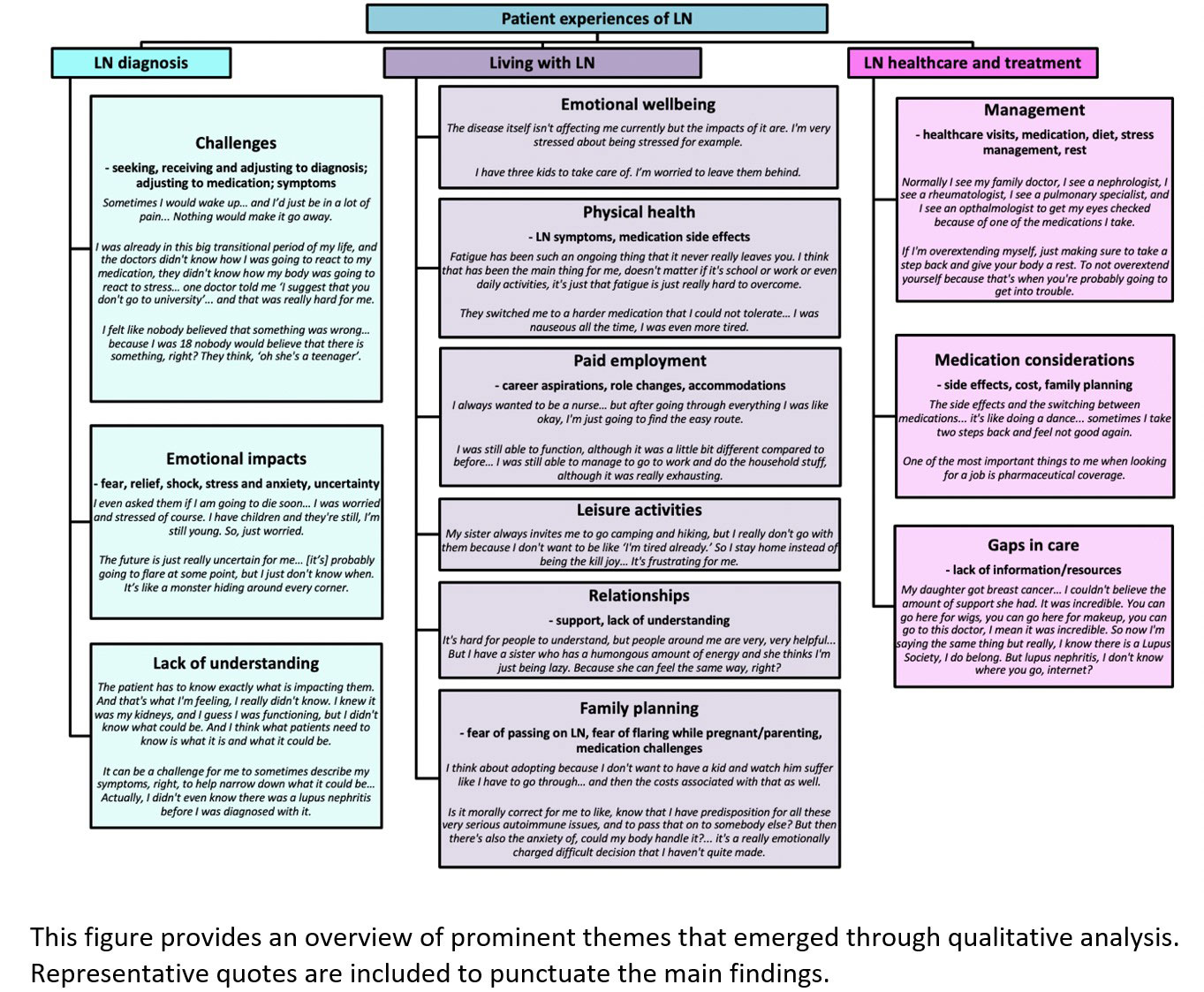Session Information
Session Type: Poster Session C
Session Time: 1:00PM-3:00PM
Background/Purpose: LN is one of the most severe manifestations of SLE; however, the patient experience remains understudied. This research investigates patient experiences and perspectives of 1) LN diagnosis; 2) living with LN; and 3) LN healthcare and treatment.
Methods: Patients aged ≥18 years with biopsy-proven pure or mixed ISN/RPS Class III, IV, or V LN and fulfilling the ACR 1997 or SLICC 2012 Classification Criteria for SLE were purposefully recruited from a Canadian lupus cohort to participate in semi-structured in-depth interviews. These were conducted virtually and transcribed verbatim for subsequent thematic analysis using NVivo Qualitative Data Analysis Software.
Results: Nineteen patients with LN were interviewed; 89.5% were female, mean (SD) age was 43.0 (15.7) years, mean (SD) age at SLE diagnosis was 29.8 (13.2) years (Table). Patients reported challenges seeking, receiving, and adjusting to the LN diagnosis, and all described emotional impacts associated with diagnosis (‘The future is really uncertain for me… it’s like a monster hiding around every corner’). Most patients had not heard of LN prior to diagnosis, and this lack of understanding made it difficult to contextualize their illness (Figure).
Patients reported both emotional wellbeing and physical health impacts associated with living with LN. While most have continued in paid employment, patients identified altered career aspirations, role changes, and the need for accommodations in the workplace. Patients also described modified leisure and social activities (‘I stay home instead of being the kill joy… It’s frustrating for me’). While many identified supportive friends and family, a lack of nuanced understanding of their experiences by others was reported (‘I have a sister who has a humongous amount of energy and she thinks I’m just being lazy’). Amongst those of childbearing age before/when diagnosed, LN was described as a factor in their family planning considerations. Specifically, fear of changing LN medications and their reproductive side effects, fear of experiencing a flare while pregnant/when parenting, and concerns about passing on LN/other autoimmune conditions to their children emerged (Figure).
Numerous aspects of LN management present challenges for patients including visiting a range of healthcare providers, taking medication, monitoring diet, stress management, and ensuring adequate rest. While many reported successful LN management with medication, others expressed concern with cost and side effects (‘It’s like doing a dance… sometimes I take two steps back’). The challenges associated with a lack of LN-specific information and resources were identified (Figure).
Conclusion: A lack of individual and public understanding of LN coupled with the uncertainties of diagnosis/living with LN create a substantial psychosocial burden as patients negotiate acceptable risk in the face of uncertainty (eg., in family planning, treatment, paid employment, leisure). Results emphasize the need for wider LN awareness and will inform the development of LN-specific patient resources to increase understanding of LN and better support decision-making.
Funding: GSK (GSK Study 218747)
To cite this abstract in AMA style:
Cardwell F, George S, Boucher A, Barber M, Cheema K, Elliott S, Clarke A. Exploring Canadian Patient Experiences of Living with Lupus Nephritis (LN) [abstract]. Arthritis Rheumatol. 2022; 74 (suppl 9). https://acrabstracts.org/abstract/exploring-canadian-patient-experiences-of-living-with-lupus-nephritis-ln/. Accessed .« Back to ACR Convergence 2022
ACR Meeting Abstracts - https://acrabstracts.org/abstract/exploring-canadian-patient-experiences-of-living-with-lupus-nephritis-ln/


